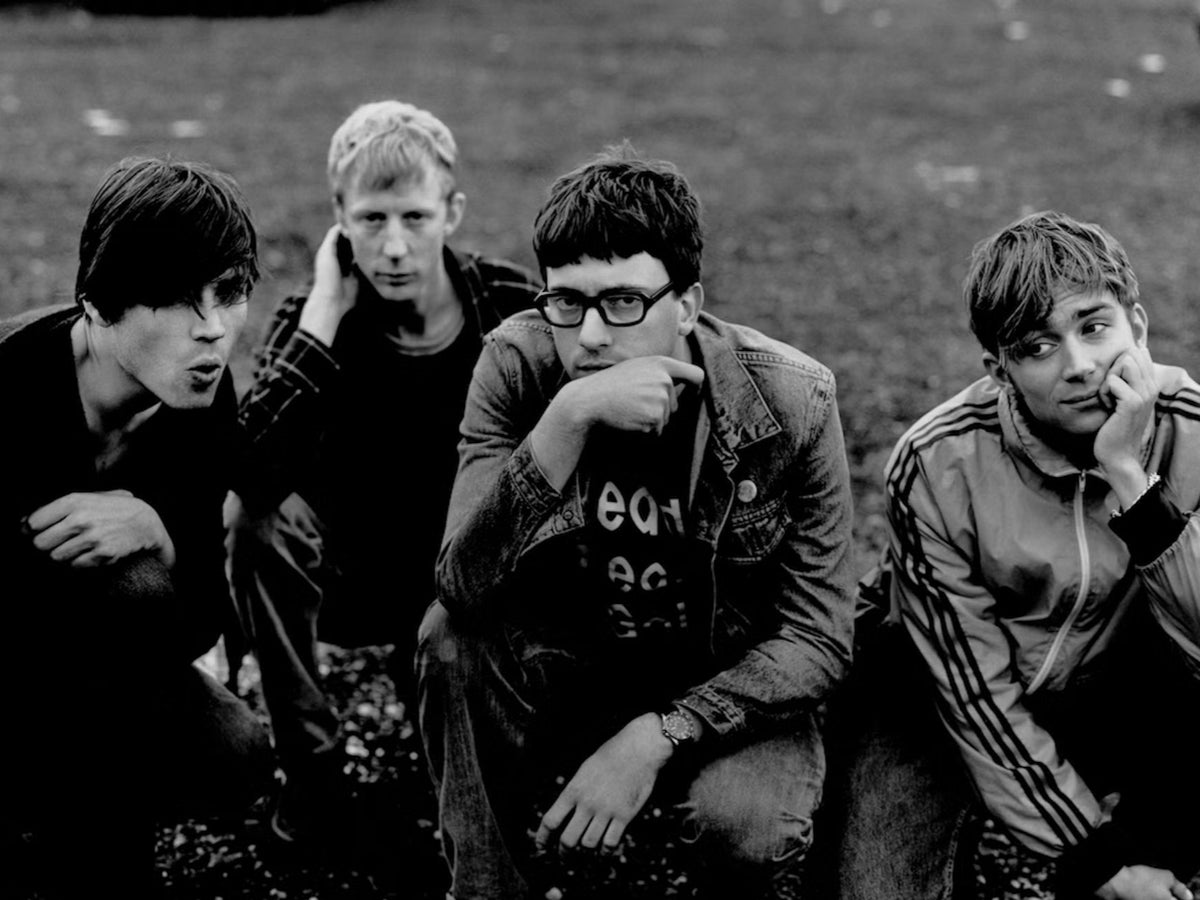
Is there any band more reflective of modern Britain than Blur? Earlier this month, they united the nation at Wembley (our “agnostic temple”, they called it). Workaholic, melancholic Damon Albarn stood out front in his ironic, Essex boy tracksuit, while complex, nerdy Graham Coxon scrawled angry edges on Albarn’s pretty tunes with his guitar. At the back, a load of giddy bounce courtesy of Labour councillor Dave Rowntree on drums and the Tory hobnobber Alex James on bass. Apathy energised. Ambition eyerolled. Despair romanced. Brainless rock-outs and sentimental overthinking. Our isolating bubbles briefly burst by a stadium-sized bawl-along to “Parklife”.
Seeing the gigs trending on social media, my kids asked me to explain Britpop. “Tesco disco,” I told them, quoting a line from Blur’s triumphant ninth album, The Ballad of Darren. Nostalgic, almost painfully self-aware and chocca with choons, it’s a little mid-tempo in mood, but still the band’s best record since 1999’s 13.
Albarn apparently wrote the songs in a series of American hotel rooms. (It’s a setting that has historically been good for him; he wrote much of 1993’s excellent Modern Life Is Rubbish in bland suites across the Atlantic.) These are mostly sad songs that hint at the possibility that he has split from his long-time partner, the artist Suzi Winstanley. “I just looked into my life/ And all I saw was that you’re not coming back,” he laments on opening track “The Ballad”.
“Charles Square” begins with the angry admission: “I f***ed up/ I’m not the first to do it”, while “Barbaric” finds him pleading for an opportunity to “talk to you about what this break-up has done to me/ I have lost the feeling that I thought I’d never lose/ Now where am I going?” “Don’t punish me,” he begs over the wonky arpeggios of “Goodbye Albert”. Then again, all of this could instead be about his band’s many fallings out and reunions. The “Darren” of the title is a long-term crew member, but also a stand-in for an everyman of a certain age. (The name peaked in popularity for babies born in the 1970s, but fell out of the top 100 boy’s names in 1994.)
If such bittersweet reflections came packaged on a solo Albarn release, they’d probably be set to sorrowful, detached, acousto-electronic sounds. But his old friends have alchemised those sentiments into songs that elevate his suburban tristesse into moments of sheer ecstasy. According to James, the band leapt around the studio while working on “Charles Square”, a track that harnesses the moshpit spirit of “Song 2”. It’s here where Albarn references the “Tesco disco” (perhaps a subtle nod to the supermarket visit referenced in Pulp’s Britpop standard “Common People”). Coxon throws himself into thrash and discordant squall mode, while Rowntree batters his kit. You can almost hear James pogoing about as Albarn howls, screams and camps up the idea of fleeing from a B-movie creature with “long and slender claws”.
But the real monster hiding beneath Albarn’s bed is isolation. The musician recently left London to live full-time at his very big house in the country. He snarls about loneliness and, self-skeweringly, of how “every generation has its gilded posers”. He continues to examine the ego trip that is pop stardom on the supremely catchy single “The Narcissist”, on which Coxon channels a little Johnny Marr jangle and Albarn’s voice cracks through falsetto as he pleads not to be hurt again. Later, there’s a nod to The Jam’s Britpop-foreshadowing “That’s Entertainment” (1980) on “Barbaric”.
“Russian Strings” is a sad hymn for the individual’s powerlessness in the face of terrible world events. It wraps a ballroom piano and woozy beach-bar guitar around a peak Albarnian lyric about not hearing the tumbling down of tenement blocks “with headphones on”. “There are strings attached to all of us,” he sighs. “There’s nothing in the end, only dust/ So turn the music up/ I’m hitting the hard stuff.” This attitude isn’t a world away from the shrugged bop of their first Top 40 single “There’s No Other Way” (1990).
I remember first seeing Blur live around the time that song made the Top 10 – Albarn cocky and staring into space. Now in his fifties, he sounds like a man for whom that disconnect comes at a higher price, his sharp sneer softened by painful experience. Yet freighted with more hope, too. “Goodbye Albert” stacks “Avalon”, bringing the bolstering brass as Albarn conjures images of aeroplanes flying over his Devon home on their way to war. The album closes with “The Heights”: a smudgy horizon on which Albarn reaches acceptance. There’s a military-parade stoicism to Rowntree’s drumming, neatly balanced by Coxon’s freer jamming.
Albarn has previously knocked The Rolling Stones for banging out the hits into their dotage. Here, he asks: “Are we running out of time?” But still, he is reaching forward: “Seeing through the coma in our lives” towards “something so bright out there you can’t even see it/ Something so momentary that you can only be it...” It’s the loveable mumbling of your mate on a wobbly stagger back from a late night. A moment of drunken clarity before the track – and album – dismantles itself into feedback and white noise. Like the end of an old pub gig. All that’s missing is the sound of DMs sticking and slopping across a floor lacquered with cider and blackcurrant.







